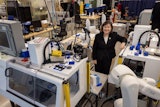TRAVERSE CITY, Mich. (AP) — The U.S. government will not use its stake in General Motors to make social policy such as offering more fuel efficient vehicles or limiting auto emissions, the head of a task force overseeing the industry said Wednesday.
Task Force Chairman Ron Bloom told reporters that the management of GM and Chrysler will be left to their boards of directors. He says policies such as corporate average fuel economy standards or carbon dioxide emissions regulations will be made separately by the Obama administration and will apply to the entire auto industry.
GM and Chrysler have received a total of $65 billion in federal aid, and both have emerged from Chapter 11 bankruptcy protection. The U.S. government owns 61 percent of GM and about 10 percent of Chrysler with the Canadian government.
"To my knowledge we never said 'gee, we ought to go easy on CAFE because we've got a bunch of money in GM,'" Bloom said.
Bloom, speaking at the Center for Automotive Research Management Briefing Seminars in Traverse City, Mich., where was on a panel about government intervention in the auto industry, also said the government is not currently considering further aid to auto parts suppliers.
Suppliers have been under extreme financial stress as auto sales have declined in the recession and auto companies have cut production.
But Bloom said the suppliers that have gone into bankruptcy protection have been able to get financing, and the court process has worked as intended. The amount of factory capacity in the parts business has to be reduced, just like it was with the automakers, he said.
"You cannot maintain a supply base for 17 million cars when you're not selling 17 million cars," he said.
U.S. auto sales had been running below a 10 million annual sales rate for much of this year until July, when it topped 11 million due mainly to government incentives to trade in clunkers. But it was 16 million or 17 million as recently as 2007.
But another speaker, Linda Hasenfratz, CEO of auto parts supplier Linamar Corp., told the conference that the government should get involved in helping suppliers obtain financing they need as GM and Chrysler bring factories back on line.
So far this year 32 suppliers have entered bankruptcy, compared with eight for the same time last year, and more bankruptcies are expected because they can't borrow money to ramp up to make parts for automakers, she said.
"We just don't have access to affordable credit," she said.
Suppliers generally are not paid until 45 days after they deliver parts, so they have to front the money for raw materials and other expenses until they are paid by automakers.
Banks are reluctant to loan suppliers money or extend terms because of the distress in the industry, Hasenfratz said. Without government loans or guarantees, the reduction of factory capacity in the industry might not be orderly, cutting employment and technology research "for decades to come," she said.
Bloom also told reporters that the task force's work force will shrink to fewer than a half-dozen employees as it becomes more of a monitor of the government's investment in GM and Chrysler.
He said GM likely will sell stock to the public in 2010, but Chrysler will be sometime after that.
He is confident that the $8 billion the government has allocated to get Chrysler from bankruptcy emergence to profitability will be enough, saying that Chrysler saw a sales resurgence in July.
Chrysler's sales for the first seven months of the year are down 42 percent, but its July results were far better, down only 9.4 percent from the same month in 2008.
"Sales aren't down. Sales are above plan. The whole industry is down. Chrysler had a pretty good July," Bloom said.
Chrysler, he said, will become a more nimble company with a much faster vehicle rollout pace than normal in the auto industry. Its new management, controlled by Fiat Group SpA, will give it a different emphasis on marketing and products, Bloom said.
Both automakers, although technically private companies, will file quarterly earnings reports and will voluntarily submit reports to the U.S. Securities and Exchange Commission, Bloom said.
It's too early, Bloom said, to predict how the government's intervention in the auto industry will play out. Without government aid, GM and Chrysler would have been liquidated and the job losses "horrific," he said.
"I hope we draw the conclusion that people came together, made very difficult decisions and got themselves a new lease on life and took advantage of it," he said. "I hope that's the lesson that we draw. But history isn't written yet."



















